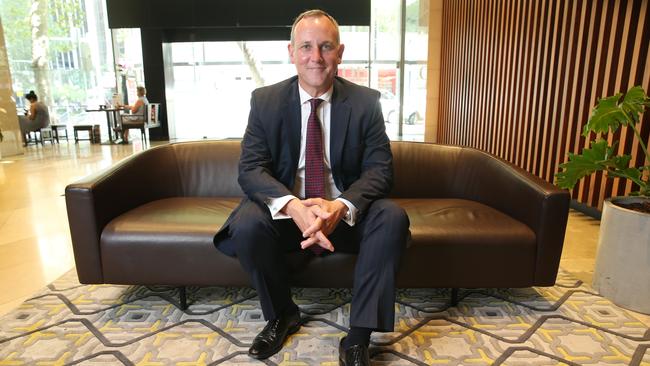‘Reduce carbon or pay the price’: Metrics Credit warning to companies over financing
Australian companies will have increasing difficulty raising finance in future if they don’t have credible plans to lower their carbon emissions.

Australian companies will have increasing difficulty in raising finance in future if they don’t have credible plans to lower their carbon emissions, Andrew Lockhart, the managing partner of private debt provider Metrics Credit Partners, has warned.
Mr Lockhart said there was growing evidence that both shareholders and debt providers were asking more questions about companies’ commitment to reducing emissions in making their investment decisions.
“Companies’ ability to access finance and raise capital is going to be largely impacted by their willingness to adhere to the social, governance and environmental standards that the market will require,” he said in an interview with The Australian. “Companies will see their cost of capital increase dramatically if they fail to achieve market expectations in relation to their ESG KPIs (key performance indicators).
“It’s the companies that demonstrate consistency of performance in relation to their ESG KPIs that are going to be able to receive appropriate financing for their activities.” Founded in 2011 by former National Australia Bank staff, Metrics Credit is one of the largest non-bank providers of private debt in Australia, with more than $13bn in funds under management.
The company is a member of the Net Zero Asset Managers Initiative, founded in December 2020 by asset managers committed to supporting the move to net zero carbon emissions by 2050.
The alliance now includes 291 asset managers around the world with more than $US66 trillion ($98 trillion) in assets under management.
Metrics is stepping up work with its borrowers to set targets to reduce their carbon footprint.
It has vowed to have 97.5 per cent of its total assets under management managed in line with net zero by 2030.
This involves getting borrowers in its corporate loans, private equity and project finance portfolio to reduce their Scope 1 and 2 emissions from 3.2C-equivalent in 2021 to 2.3C by 2027 with a goal of having their Scope 3 emissions going down to 2.5C by 2027.
Mr Lockhart rejected suggestions that companies moving to reduce their carbon emissions would face increasing costs in the short term.
He said there was growing evidence that companies that did not show a positive commitment to reducing carbon emissions would be penalised in financial markets.
Mr Lockhart’s comments come as the federal government has signalled plans to introduce mandatory disclosure requirements on carbon emissions.

Federal Treasurer Jim Chalmers last week released a consultation paper on the development of a climate risk disclosure framework for Australian companies.
He said he expected reporting requirements would be mandatory and phased in over time.
The government has asked for submissions on the issue by February 17 next year.
The move was welcomed by organisations including the Financial Services Council, the Australian Council of Superannuation Investors and the Australian Sustainable Finance Institute, which have been pushing the federal government towards introducing mandatory disclosure regimes in line with developments in Europe and the US.
Research by ASCI has shown that 103 of the ASX 200 companies in Australia report their climate risk disclosure in line with the Task Force for Climate Related Risk Disclosures (TCFD) – but the financial organisations have been pushing for mandatory requirements to apply across broader corporate Australia.
The government has also signalled plans to encourage the development of a sustainable finance industry in Australia, with Mr Chalmers asking the federal Treasury to develop a strategy for the sector.
He said this would include measures to “improve transparency, deepen Australia’s green finance markets and seize the opportunities presented by the surging global momentum in sustainable finance”.
He said the move, which will involve consultation with the Council of Financial Regulators, would include the development of new standards or “taxonomies” for sustainable investment, further initiatives to reduce greenwashing and strengthen ESG labelling, and “more ambitious participation in global forums to support climate and sustainable finance frameworks and investment.”
Metrics’ investment director of sustainable finance, Alison Chan, said the federal government’s move to introduce mandatory disclosures for Australian companies was “very welcome” but the global financial sector was already pushing ahead with encouraging the companies they invested in to commit to net zero. She said the Net Zero Asset Managers Initiative now represented organisations with more than half the global assets under management.
“The financial sector is making its own way in this regard,” she said.
Ms Chan said Metrics’ emission reduction goals for its financing were significantly higher than those for banks and most other financers in Australia at the moment.
But Mr Lockhart said the real pressure on Australian companies to decarbonise was coming from investors.
A recent survey by global consulting firm bfinance, showed that asset managers in Australia, including superannuation funds, insurance companies, sovereign wealth funds, endowment funds and family offices, were more active in committing to reduce their portfolio emissions than their global peers.
The survey showed that 90 per cent of asset managers polled in Australia were planning to integrate ESG into their operations, compared to only 69 per cent of their global peers.
Some 48 per cent were targeting a move to net carbon zero, compared to 24 per cent of their global peers.
Ms Chan said an increasing number of Australian companies are now realising that setting net zero targets is important for shareholders and lenders.
“We will continue to see a rapid rise in companies setting their own net zero targets,” she said. “You’ve seen an increasing interest from the banks in providing sustainability linked loans, as there has been from borrowers.”








To join the conversation, please log in. Don't have an account? Register
Join the conversation, you are commenting as Logout